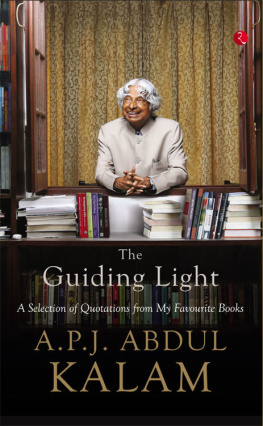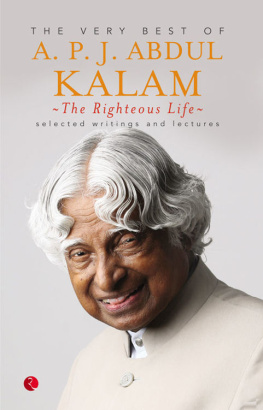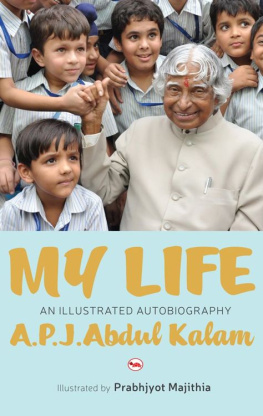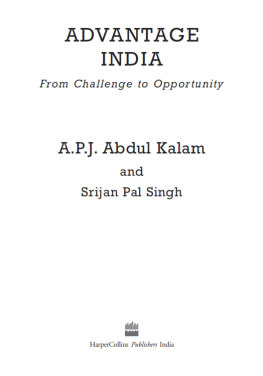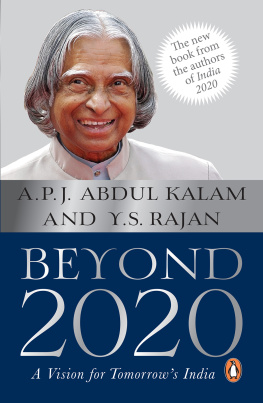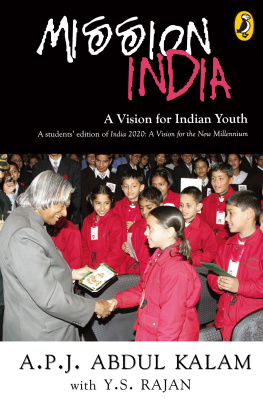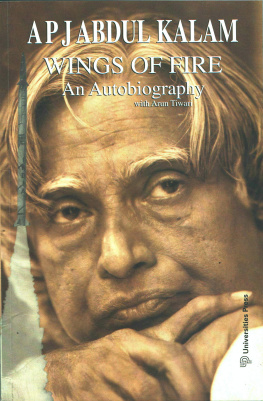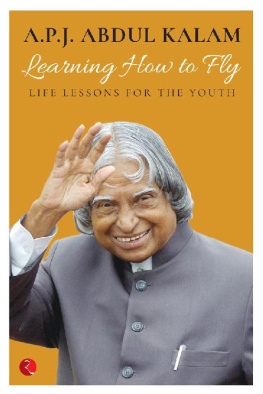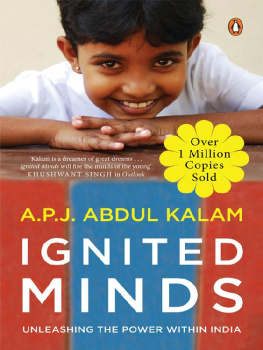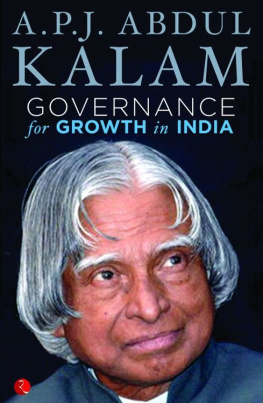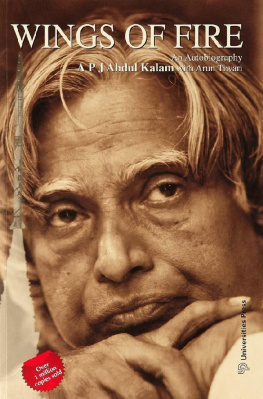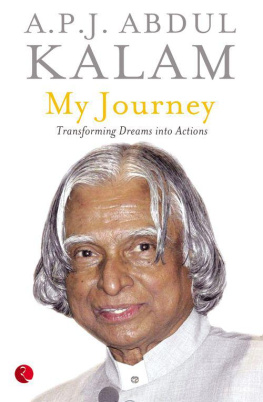The Guiding Light
Also by the author
My Journey: Transforming Dreams Into Action
The Righteous Life: The Very Best of A.P.J. Abdul Kalam
Governance for Growth in India
First published by
Rupa Publications India Pvt. Ltd 2015
7/16, Ansari Road, Daryaganj
New Delhi 110002
Sales Centres:
Allahabad Bengaluru Chennai
Hyderabad Jaipur Kathmandu
Kolkata Mumbai
Anthology and introduction copyright A.P.J. Abdul Kalam 2015
Copyright for the individual pieces vest with the authors or their estates
All rights reserved.
No part of this publication may be reproduced, transmitted, or stored in a retrieval system, in any form or by any means, electronic, mechanical, photocopying, recording or otherwise, without the prior permission of the publisher.
First impression 2015
10 9 8 7 6 5 4 3 2 1
The moral right of the author has been asserted.
Printed by XXXXXX
This book is sold subject to the condition that it shall not, by way of trade or otherwise, be lent, resold, hired out, or otherwise circulated, without the publishers prior consent, in any form of binding or cover other than that in which it is published.
Contents
Introduction
I dont remember the first book I ever read. It is almost as if books were always there in my life, a solid, tactile presence that exuded comfort and assurance. Yet, I know it was not so. When I was growing up, I lived in a small town in southern IndiaRameswaram. It did not have a library, and of course no bookshops. We studied the holy book, the Koran, diligently and pored over our schoolbooks. For anything more there were the newspapers. For a while I worked as a newspaper delivery boy, during the days of World War II, and the feel of crisp, fresh paper on my fingers is a sensation that still gives me pleasure.
My introduction into the world of books and reading happened through my friend, brother-in-law and first mentor, Jallaluddin. He was, at the time, when I was about ten years old, the only fully literate adult inhabitant of the town. He had studied up to the Intermediate level and then gave up as he needed to start working and earning. But he had an expansive, curious mind. His interests lay beyond the concerns of the island and there were evenings when he read reports from the newspapers and told us of a world beyond the one we inhabited. It was he who told us about the current political situation, news of the War, prices of precious metals, and all other such information. I spent a lot of time with him, watching him read or writing letters for the people of the town which they dictated to him. Somewhere, the power of the written word imprinted on my mind. I understood that to know and love reading meant the freedom to travel to any kind of world I wanted to. It could be the world of religion or philosophywhat I learnt in my Koran class. Or it could be poetry and imagination. Or it could be understanding the words of famous people and their lives.
Once I was older, I started reading more voraciously. I was still rather penniless since most of the little money I got was used to pay my bills while I studied at the Madras Institute of Technology. However, I discovered a tiny bookshop at Moore Market in Madras (now Chennai) whose owner was happy to lend me books for a small deposit. I started reading in earnest, quickly making my way through the classics, translations, collections of poetry and essays. I found works explaining concepts from different religions interesting and I studied the holy books and texts of Hinduism, Christianity, Buddhism, the works of Confucius. The seeds for this were perhaps laid by my father, who was a deeply religious man and knew the texts of Islam closely. By now my mind was getting ever more thirsty and I needed to know many answers.
Once I started working and got deeper into the world of science, the questions about connections between the worldly and the spiritual intrigued me. How are we all connected? Does science negate spirituality? How can we keep our beliefs while delving into matters that require theorems and proofs to establish their existence? I read the works of great scientists and philosophers who have studied these matters. Questions of morality and codes to live ones life by were also playing on my mind and the works of thinkers like J. Krishnamurthi, Ralph Waldo Emerson, Sri Aurobindo helped me to understand not only myself but the rapidly unfolding world around me. These essays and books helped me analyse situations better and understand my fellow workers and their motivations clearly.
One work that has been almost like a code for living for me is the Thirukural. It was written by saint poet Thiruvalluvar over 2,000 years ago in the great age of Tamil Sangam literature and consists of couplets or kurals. Each of these contains a profound truth or moral code, expressed in a few words but enfolding astonishing wisdom within it. There has been hardly any moment of conflict or despair in my life that the Thirukural has not helped to resolve.
The other literary form that has intrigued and captivated me from my school days is poetry. I can still recall a few poems that appeared in our literature textbooks. Later, I read the works of Shakespeare and Milton and Donne. Miltons Paradise Lost has been a particular favourite for decades and I have read and reread those lines over and over again. The works of Indian masters like Tagore and Bharatiar and Aurobindo too have deeply touched me with their visions for humankind and deep nationalistic strain. The immediate passion that a poem can capture is perhaps unparalleled in any other form. I myself have written a number of poems and each time I try to distil the essence of what I want to say into the lines, I think of the great poems I have loved and admired.
As I grew older, I started thinking more and more about this nation of ours and where we are all headed. What is the role of each citizen? What does the youth want? What are they entitled to? What are their responsibilities? What is the vision that we need to keep before us as we traverse the path towards a better and brighter future for each one of us? At this time in my life, I also became a writer myself. I published my first book successfully and before I knew it I had authored quite a number of titles. With each one not only did I get to understand the requirements of a writer better, I started thinking more deeply on issues of development and vision. My reading became more oriented towards this as I had to understand large amounts of data, look critically at reports and draw inferences that would help lay out a vision document, one we called Vision 2020. Along with these, reading the works of Gandhi, Lincoln, and the histories of nations kept me inspired to keep working on the mission of finding ways to make India a developed nation in the near future and within our lifetimes.
In this book are included lines from literary, religious and philosophical works that have inspired and guided me all through my life. There are quotations from religious texts that I have read closely and often quoted in my writings and lectures. There are the works of classical greats like Milton, Shakespeare, Donne, Tagore. There are some couplets or kurals from the Thirukural that I hope will inspire readers who havent yet been introduced to this great work, to seek out the text either in original or in a good translation and read it. There are extracts from essays that I have found thought provoking and which I feel are essential reading for everybody. The book has been divided into sections and the quotations in each fit within some broad frameworks like faith, inspirations, duties, tributes etc. But these are great works of literature and their universal appeal can be understood by reading them in any context one wishes to place them in.

